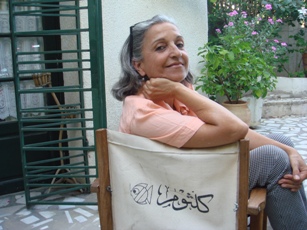Related Research Articles

Cinema of Africa covers both the history and present of the making or screening of films on the African continent, and also refers to the persons involved in this form of audiovisual culture. It dates back to the early 20th century, when film reels were the primary cinematic technology in use. During the colonial era, African life was shown only by the work of white, colonial, Western filmmakers, who depicted Africans in a negative fashion, as exotic "others". As there are more than 50 countries with audiovisual traditions, there is no one single 'African cinema'. Both historically and culturally, there are major regional differences between North African and sub-Saharan cinemas, and between the cinemas of different countries.
Bridget Pickering is a film maker and producer from Namibia. Among other projects, she was an executive producer on the 2004 film Hotel Rwanda. She is the daughter of Namibian diplomat and trade unionist Advocate Arthur Pickering.

The cinema of Somalia refers to the film industry in Somalia. The earliest forms of public film display in the country were Italian newsreels of key events during the colonial period. In 1937 the film Sentinels of Bronze was produced in Ogaden Somalia, with nearly all Somali actors. Growing out of the Somali people's rich storytelling tradition, the first few feature-length Somali films and cinematic festivals emerged in the early 1960s, immediately after independence. Following the creation of the Somali Film Agency (SFA) regulatory body in 1975, the local film scene began to expand rapidly. In the 1970s and early 1980s, popular musicals known as riwaayado were the main driving force behind the Somali movie industry. Epic and period films as well as international co-productions followed suit, facilitated by the proliferation of video technology and national television networks. In the 1990s and 2000s, a new wave of more entertainment-oriented movies emerged. Referred to as Somaliwood, this upstart, youth-based cinematic movement has energized the Somali film industry and in the process introduced innovative storylines, marketing strategies and production techniques.

Robert Jules Guédiguian is a French film director, screenwriter, producer and actor. Most of his films star Ariane Ascaride and Jean-Pierre Darroussin.

Abderrahmane Sissako is a Mauritanian-born Malian film director and producer. His film Waiting for Happiness (Heremakono) was screened at the 2002 Cannes Film Festival official selection under Un Certain Regard, winning a FIPRESCI Prize. His 2006 film Bamako received much attention. Sissako's themes include globalisation, exile and the displacement of people. His 2014 film Timbuktu was selected to compete for the Palme d'Or in the main competition section at the 2014 Cannes Film Festival and nominated for an Academy Award for Best Foreign Language Film.

Gaël Aymon is an author, screenwriter, film director and producer born in Paris, France.
Mahama Johnson Traoré (1942–2010) was a Senegalese film director, writer, and co-founder of the Ouagadougou-based Pan-African Cinema Festival (FESPACO).
The Académie des Arts et Techniques du Cinéma is an organization that gives out the César Award. It was created in 1975, on the initiative of Georges Cravenne.

Thomas Cailley is a French screenwriter and film director. In 2014, he made his feature directorial debut with Love at First Fight, which won three César Awards including Best First Feature Film. In 2023 he made his second movie The Animal Kingdom.

Tim Huebschle is a Namibian film director and screenwriter.
Tom Stempel is an American film scholar and critic. He is a Professor Emeritus in Film at Los Angeles City College, where he taught from 1971 to 2011.

Kalthoum Bornaz was a Tunisian screenwriter, film editor, and director who belonged to the first generation of women filmmakers in Tunisia. She was born in Tunisia on 24 August 1945 and moved to France in order to continue her education abroad. She worked both in Tunisia and overseas on the development of many feature-length films as an editor and director.
Jule Britt Selbo is an American screenwriter, playwright, author, producer and professor. She was born in Fargo, North Dakota. She is currently a professor in the Cinema and Television Arts Department at California State University, Fullerton and is a member of the WGA.

Bahiga Hafez was an Egyptian screenwriter, composer, director, editor, producer and actress.
Nadia Hamza is an Egyptian film director, producer and screenwriter. Before directing, Hamza worked as a scriptwriter, assistant and producer. She became a successful director and screenwriter known for making films with female leads discussing women aspirations and experiences. In 1994 she founded her own production company, Seven Stars Studio and began collaborating with other Egyptian filmmakers. Nadia believes that women director's differ from their male counterpart in regards to the subject of a film and how they handle and use the camera. She was known for portraying women and challenges societal views on working women. She has her female character's be portrayed as winners and concentrates on women's issues, especially working women.

Hicham Lasri is a Moroccan comics artist, film director, novelist, producer and screenwriter.
Richard Pakleppa is a white Namibian screenwriter, film director and film producer.
Oshosheni Hiveluah was a Namibian writer, producer, and director. She is best known for the films Tjitji the Himba Girl and 100 Bucks.
N'Diagne Adechoubou is a Beninese film director and producer.
Cecil Moller is a Namibian film director and producer.
References
- ↑ Apley, Alice and David Tamés. (June 2005) Remembering John Marshall (1932–2005) newenglandfilm.com Retrieved 1 Aug 2008.
- 1 2 Jule Selbo (2015). Jill Nelmes; Jule Selbo (eds.). Women Screenwriters: An International Guide. Springer. p. 29. ISBN 978-1-137-31237-2.
- ↑ Association des trois mondes, ed. (2000). Le Festival panafricain du cinéma et de la télévision de Ouagadougou et l'Association des trois mondes présentent Les cinémas d'Afrique: dictionnaire. Paris: Karthala ; Editions ATM. ISBN 978-2-84586-060-5.
- ↑ "Tim Huebschle | Director, Producer, Writer". IMDb. Retrieved 2024-06-03.
- ↑ "The streets, a home to many". Truth, for its own sake. Retrieved 2024-06-03.
- ↑ Namibian, The (2018-02-08). "NFC sets out 2018 mandate". The Namibian. Retrieved 2024-06-03.